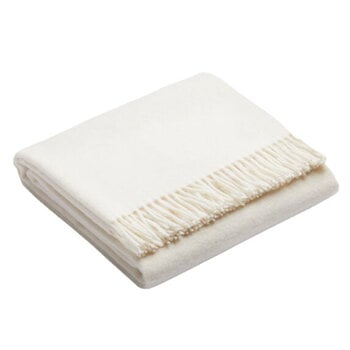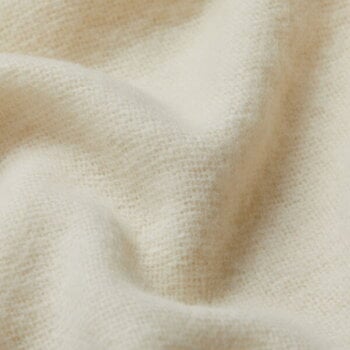Sibast’s Alpaca throw is made from a fine blend of recycled alpaca wool, sheep wool and acrylic. Due to its silky soft fibres and excellent insulation properties, alpaca wool is considered a particularly valued, luxurious and high-quality material. The hypoallergenic, water- and dirt-repellent wool blanket keeps you warm when lounging or napping, and thanks to its large size, even two people can easily wrap up in the blanket. The Alpaca throw measures 150 x 200 cm and is available in beautiful, natural tones.
Alpaca throw, white
Sibast
Description
Sibast’s Alpaca throw is made from a fine blend of recycled alpaca wool, sheep wool and acrylic. Due to its silky soft fibres and excellent insulation properties, alpaca wool is considered a particularly valued, luxurious and high-quality material. The hypoallergenic, water- and dirt-repellent wool blanket keeps you warm when lounging or napping, and thanks to its large size, even two people can easily wrap up in the blanket. The Alpaca throw measures 150 x 200 cm and is available in beautiful, natural tones.
Product details (6)
- Material
- 40% recycled alpaca, 45% wool, 15% acrylic
- Colour
- Off-white
- Length
- 200 cm
- Width
- 150 cm
- Notes
- Please note that alpaca plaid will at first shed some wool as a natural process.
- Care instructions
- Shake and air frequently. Dry clean if needed. Hand wash max 30°C and mild detergent suitable for wool. Dry flat in shade and avoid stretching. Do not tumble dry. If needed the item can be ironed at low temperature.
- Product ID
Reviews (0)
Sustainability
The Product Sustainability Framework, our criteria of sustainable design, helps you find the most sustainable products in our selection. Read below which sustainability criteria this product has met.
Working conditions & labour 6/9
-
Equal opportunities for all employees
-
Commitment to UN Global Compact, fair compensation for all employees
-
Corporate responsibility requirements defined and communicated for suppliers
-
Systematic work for improved inclusion and well-being in the workplace
-
Transparent supply chain
-
Compliance to the UN Guiding Principles on Business and Human Rights ensured in the supply chain
-
Suppliers' compliance to a code of conduct ensured
-
Direct suppliers audited and certified
-
Support for community involvement in the supply chain
Eco-friendly production 8/9
-
Fair and resource-wise water-use in production
-
No incineration or landfilling of returned items
-
No use of endangered species as materials
-
No direct environmental emissions or waste (excl. GHGs) from production
-
The sustainability of direct suppliers' production is addressed and monitored
-
Material-efficient and ecological packaging
-
Positive impact on nature’s well-being through operations that regenerate natural ecosystems
-
No potentially harmful chemicals used in own production
-
Production and material sourcing that respect biodiversity, animal rights, and natural ecosystems
Climate impact 3/8
-
Company's direct greenhouse gas emissions identified and commitment to reduction
-
Product's carbon impact identified and commitment to reduction
-
Guidance on energy- and eco-efficient use of the product
-
Contribution to climate initiatives beyond the brand’s direct operations
-
Low-carbon or compensated transportation
-
Carbon footprint of the product calculated and goals set to reduce it
-
100 % renewable energy in own production and operations
-
Carbon neutral or carbon negative product
Sustainable materials 5/6
-
Sustainable and long-lasting material choices
-
No harmful or hazardous substances
-
Responsible raw material sourcing and production
-
Materials suited for circularity: monomaterials, recyclable finishings, renewable or recycled contents etc.
-
Ecological materials: natural, biodegradable, recyclable or recycled contents
-
Outstanding materials in terms of innovativeness, responsibility, sustainability and circularity: local production or sourcing, 100 % recycled content, C2C-certification etc.
Circular design 4/5
-
High aesthetic quality promoting long-term use of the product
-
Technically durable product design and material choices
-
Design for enduring life-long quality
-
Design and support for product maintenance, repair and upgradability
-
Innovative circular design solutions: circular service system, resale platform, remanufacturing, collection of used products, etc.








